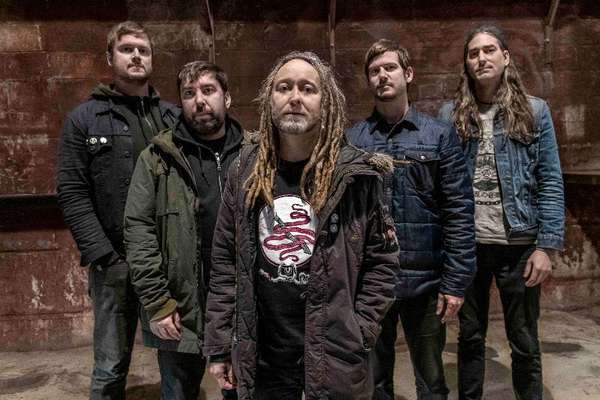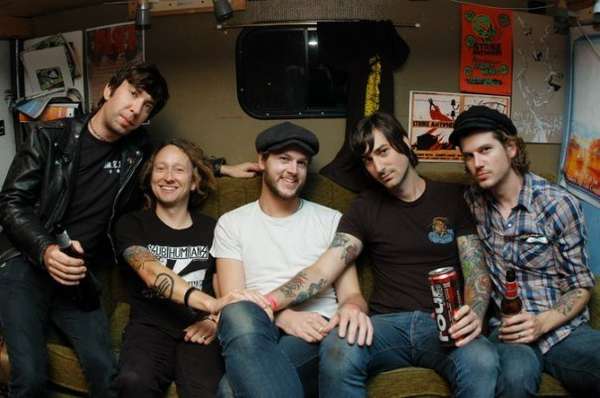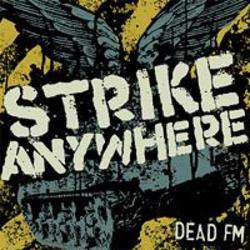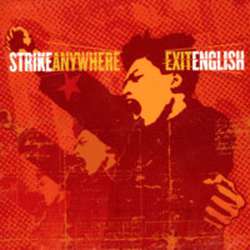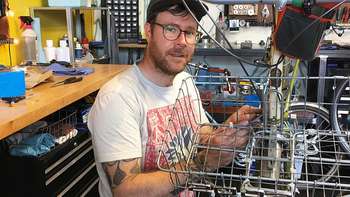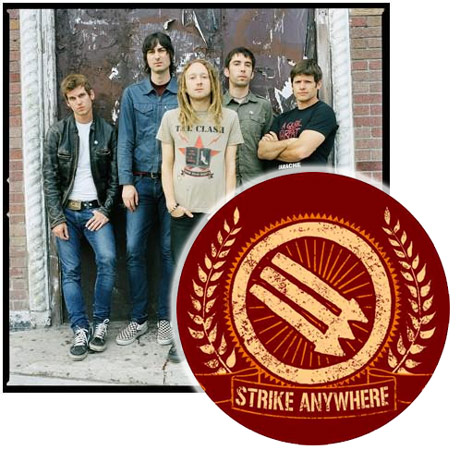
Anyone familar with Strike Anywhere will be aware of their sincerity and consistency throughout their career. Equally sincere is their frontman, Thomas Barnett, a force of lyrical fury and intellectual reason. When Scene Point Blank's Matt sat down with Thomas, we talked about the recently uploaded footage of a UCLA student tasered by police on YouTube in between recording. Barnett's reaction to the news of independent footage exposing corrupt police was simple: "Fucking awesome". In the interview we talked about similar themes: operational purity, working class ethics, Japanese prisons and the ubiquitous major label discussion.
Scene Point Blank: Where did the idea for the video for "Instinct" come from?
Thomas Barnett: We always had a concept of having a guerrilla show with a generator at one of these strange old abandoned factories that are by the James River, in our hometown of Richmond, Virginia. We had the idea of having this filmed, and then we wanted Instinct to be the song, and then Justin Sacks from Minneapolis, really seemed to get it, instantly, and he submitted the treatment for the film that had this narrative about all of the different kids who were coming to the show - helping to build the show by stealing batteries, siphoning gas, taking Christmas lights, getting power, and us bringing the generator, and having that narrative be worked into the document of a live event. So, it worked out better than we ever thought, and we spent the hottest weekend of last summer in our hometown breathing in red dust that was probably laced with particulate petroleum and lead from the battery reclamation center and gas works where we filmed it.
The whole punk community came out, older legends and bands such as Four Walls Falling gave us lights, we had everybody help with all the different production aspects and about a hundred kids jumping around and screaming their heads off. Instead of it being a story about a generator show, a DIY show, it actually is now a documentary of a DIY show, so it was like that fourth wall or whatever that happens in journalism when it becomes the thing which you think is fiction. We loved it, it was really fun to do.
Scene Point Blank: I heard that you've moved out of Richmond, Virginia, is that right?
Thomas Barnett: Garth and Eric still live in Richmond, Matt Smith lives in Baltimore, Maryland for four or five years. Sherwood has moved to the mountains of western North Carolina, which is... in US terms, not that far, it's like ten hours, twelve hours away from Richmond -
Scene Point Blank: - Ten hours away from right here would be a different country.
Thomas Barnett: Yeah, like Denmark or something, right. So I guess it's hard to relate that, but I live 3000 miles from Richmond now; I live in Porland, Oregon. But I lived in Richmond for thirty years. My wife is in law school in Oregon, so between tours I stay with her. But yeah, that's why I'm there. But Portland is a really neat city, and it's newer than Richmond, Virginia, but of course it's still got a lot of old history and ghosts and raw industrial beauty, and a hell of an amount of counter-culture, like punk scenes on top of punk scenes, overlapping, like ghosts and the city at the same time. It's amazing.
Scene Point Blank: Does that make it harder to feel attached to Richmond?
Thomas Barnett: No. I mean, after you live thirty years in one place, and not just live there passively but read about the forgotten histories and take place in street marches, spend nights and days on train tracks and in alleys and basement shows, everything that our punk community was about was built in the city itself, and trying to find a space where you can have it, because it's very conservative and high-bound and aristocratic place, and there's all this ignorance, but there's these little moments of beauty, like subversive culture; like the history of Southern abolitionists, the American Civil War is seen as this very monolithic thing, it's like racist Southerners versus liberating Northerners, when in fact it's a lot more complicated and nuanced, and there's a lot of folks in the South, who are agitating for liberation of black people, and they were also helping to subvert the cause, and there's a lot of amazing stories about that. But then, in the present day, there's a great deal of civil rights history that happens, these great marches for the Living Wage, this anti-poverty group we worked for, and still do.
We come to Richmond a lot, I spend a lot of time there, on the bookends of tours, rehearsing, writing songs, playing shows. We have special acoustic benefit shows for the Living Wage group, and we would march with the progressive African-American clergy, the eldest of whom had marched with Dr. King. So, it's Caucasian punk kids and other radicals, in this fabric of human civil rights movement, all together, marching for a living wage - that's something I could never forget or be distant from. These are huge things in my consciousness. There's other things to learn about other cities, but there's so much that was invested in Richmond, and this band wouldn't have happened if it wasn't for Richmond, Virginia and its counter-culture, so we definitely still claim it as our hometown and always will.
Scene Point Blank: Bands with a similar political message to Strike Anywhere such as Anti-Flag and Against Me! have recently signed to major labels. Do you think they deserve the criticism and "sellout" accusations they're getting?
Thomas Barnett: No. I think that as long as people are critical but they also understand that those folks in those bands - good people, friends of ours - they made these choices to the best of their abilities for good reasons, and everyone changes. And everyone changes, and they still change from the heart. In the States, things feel really desperate and our counter-culture is under attack from all kinds of things, and there's not any sign of support for underground arts. I mean, even on a business level; businesses are closing all the time and, in Richmond, our home town, our university is in collusion with the city council to take away all the spare property, so the all-ages club that we'd had for twenty years got shut down the other day, for good.
Getting punk ideas, and ideas about anti-war activities and peace, changing consciousness, changing society, there's not a lot of avenues; they're all closing, in the sense that you can go into a corporate machine and try your best to save lives through that process, or you can stay extremely isolated in a narrowing field, pulling people into this increasingly elitist and leisure class, middle class white kid specialised university city basement scene that is obsessed with operational purity. It just depends on what you want to do. Like, if you wanna build something that is exclusive, and constantly in this defensive posture, then you'll have that, and it'll be this precious commodity. But if you want a counter-culture that makes mistakes while it lives and breathes and tries to share its ideas and build something, and bring new people into it, then you will make choices that sometimes that other people will be critical with you for.
I think it's really comfortable to be a journalist or be a musician and then have opinions about other bands having not walked in their shoes. Plus, there's so many other moments where like, Chumbawamba, and the Clash, and a litany of other bands with brilliant politics and brilliant ideas - At this point, Strike Anywhere's UK Tour Manager Lloyd comes in bearing drinks for Thomas and the band. - Oh, you're a genius, thanks Lloyd Chambers! I love you! I don't even know what Lucozade is, should I have a Lucozade?
Scene Point Blank: It's an energy drink.
Thomas Barnett: Is it crazy?
Scene Point Blank: It's pretty crazy, yeah.
Thomas Barnett: Anyway, that was a long answer, but that was a good question, I don't wanna take up your time with the answer. Bit those guys are our friends and we know why they made those choices. And we would not necessarily make the choices that they did, but we back them, we would tour with them. Especially in the case of Anti-Flag, they tried their best, as big as they were in the independent community, to make a difference. And they had this opportunity that they thought was as good as it could be under a corporate context to try and make a move. And they also have mentors such as Tom Morello and people in their lives who did have a good deal of effect and influence, being on a major label and being a political band at the same time. So I think that's where they're coming from with their choice.
As far as Against Me!, I don't really know. Like, we know those guys socially, but we've never played a show together. And we actually don't know how many of the same audience we share. We heard that they've had their tyres slashed; they've had people protest their shows... just like, hurtful, hurtful things to them. It's strange that people would believe in a band so much, and want them to be this idea so badly, I think the folks who feel so hurt and compromised by these choices spent a lot of time putting all of this unjust weight on Against Me!, you know, being four guys from Florida who just wanted to play music and tour the world and have fun. I think it's really difficult. Again, maybe it's time for anarchist bands to take risks, to be under those bright lights for a while and see if it helps. We should have this vertical scale of communication within the punk scene, like: Against Me! should be able to call on a special red Batphone, like Batman, and call Chumbawamba and say "Hey, fellow anarchist band! We have this choice that we're being faced with, much like you did, and you did this, and how was it? Where are you now and what does it mean? And what did it mean then?" - that would be interesting.
For us, it's more like, we feel comfortable and happy in the independent community, it's not part of our self-righteousness that we're compromising our operational ethics; that happens on a day-to-day basis, there's all kinds of choices that you make, and collaborations that you despise that are also part of just continuing to transform and live this life. I think it's shrill and mean-spirited and revisionist to talk about punk as collectively only pure when it's in this DIY context, because I think it's meant a lot of things to a lot of people, and done a lot of good on a lot of different levels. And bands have to understand what they're gonna be the best at doing, how they can make it make sense and project their ideas, and stay disciplined, and still make all the connections into their roots that they need to make.





